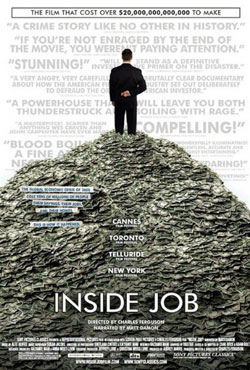LFF: Inside Job – 4*
 With recent news of 200 RBS bankers possibly getting £1 million pound bonuses each, surely the last thing you’d want to see is a film about these smug fat cats and the global financial meltdown they helped cause. There will be popcorn directed at the screens for sure. But like a taunt fictional thriller – and Hollywood couldn’t have made this stuff up, if it hadn’t been real, Charles Ferguson‘s documentary, Inside Job, develops into engaging and probing car-crash viewing because it places those responsible on camera, so we see their mug shots, and watch them squirm for our pleasure, much like a public execution. Let’s face it; it’s the closest we will get to one. Sadly, the big fish that need frying escape Ferguson’s net, for example, former chairman of the Federal Reserve Alan Greenspan and former US Treasury Secretary Paulson who declined to be interviewed, protected by the fortress institutions they helped build, no doubt.
With recent news of 200 RBS bankers possibly getting £1 million pound bonuses each, surely the last thing you’d want to see is a film about these smug fat cats and the global financial meltdown they helped cause. There will be popcorn directed at the screens for sure. But like a taunt fictional thriller – and Hollywood couldn’t have made this stuff up, if it hadn’t been real, Charles Ferguson‘s documentary, Inside Job, develops into engaging and probing car-crash viewing because it places those responsible on camera, so we see their mug shots, and watch them squirm for our pleasure, much like a public execution. Let’s face it; it’s the closest we will get to one. Sadly, the big fish that need frying escape Ferguson’s net, for example, former chairman of the Federal Reserve Alan Greenspan and former US Treasury Secretary Paulson who declined to be interviewed, protected by the fortress institutions they helped build, no doubt.
The dramatic start of Iceland being the first domino to fall sets the scene in a film divided into five parts, each one steadily mounting the tension. Like Al Gore’s 2006 environmental film, An Inconvenient Truth, Inside Job breaks down the crisis into layman’s terms for the ‘hard-of-economics-hearing’ – this reviewer included. If you’ve ever wondered/switched off to what a subprime loan, derivative or AAA rating is, the simple graphics combined with file footage and on-camera explanation actually make for an exhilarating lesson, like you’re reliving the meltdown once more. It’s emotively edited, including some victims’ stories, predominantly US-slanted, and narrated in an incriminating manner by actor Matt Damon, but it gets the message across.
As well as revelations of ‘anti-family’, after-hours ‘entertainment’ (basically, hookers and coke) that sounds like a prerequisite for any key moneyman in the city, the sheer extent of their inconceivable markets gambling hits home. As Citigroup’s Chief Economist Willem Buiter states, banking became a ‘p***ing contest’ – and it probably still is. There is a growing feeling of resentment as you watch, followed by despair, as each successive US President tries to curb the borrowing practices and regulate the money giants, but with sinister consequences. If the financial heavyweight isn’t part of the government, they control the bank that funds it – and move between the two, effortlessly. Ferguson and his willing interviewees suggest one of the world’s most powerful leaders is merely the bankers’ puppet.
There is some ‘light relief’, though, when the film-maker goes after former key financial insiders who often, disturbingly, sit on the boards of the US’s top universities, and preach the ‘bad practice’ of deregulation stunting growth to the next generation, whilst taking extortionate fees from whoever pays top dollar. There is a priceless and gleeful moment, when former member of the Board of Governors of the Federal Reserve System, Frederic Mishkin, who is also a full professor at Columbia Business School since 1983, inarticulately claims there has been a ‘typo’ in his original CV, after one of his papers listed, written for the Icelandic Chamber of Commerce, mysteriously changes title from ‘Financial Stability in Iceland’ to ‘Financial Instability in Iceland’. It’s all very juvenile but somewhat satisfying to see these financial ‘gurus’ getting a little hot under the collar.
What sounds like a rather dry box office offering actually turns out to be a frightening, hilarious and ultimately rousing experience – exactly what a good investigative documentary about the world’s biggest account of (ongoing) White Collar crime should be. At the same time, Inside Job is guilty of fanning the flames of controversy for entertainment’s sake, being Right-Wing-slanted, and outrageously depicting the UK’s involvement as almost squeaky-clean. However, each US President gets a personal dig, including Obama, and as an informative analysis for the average Joe on the global financial collapse, Inside Job ultimately leaves you exacerbated at how blurred politics and banking are. As quoted in the film: “It’s a Wall Street Government”.
4/5 stars
By @FilmGazer